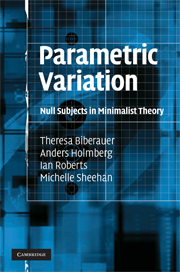Book contents
- Frontmatter
- Contents
- Acknowledgements
- Introduction: parameters in minimalist theory
- 1 A deletion analysis of null subjects
- 2 Null Subject Parameters
- 3 Control into finite clauses in partial null-subject languages
- 4 Semi null-subject languages, expletives and expletive pro reconsidered
- 5 The null generic subject pronoun in Finnish: a case of incorporation in T
- 6 ‘Free’ inversion in Romance and the Null Subject Parameter
- 7 Subjects, Tense and verb-movement
- 8 Varieties of French and the Null Subject Parameter
- Bibliography
- Index
1 - A deletion analysis of null subjects
Published online by Cambridge University Press: 04 August 2010
- Frontmatter
- Contents
- Acknowledgements
- Introduction: parameters in minimalist theory
- 1 A deletion analysis of null subjects
- 2 Null Subject Parameters
- 3 Control into finite clauses in partial null-subject languages
- 4 Semi null-subject languages, expletives and expletive pro reconsidered
- 5 The null generic subject pronoun in Finnish: a case of incorporation in T
- 6 ‘Free’ inversion in Romance and the Null Subject Parameter
- 7 Subjects, Tense and verb-movement
- 8 Varieties of French and the Null Subject Parameter
- Bibliography
- Index
Summary
Introduction
One often-noted consequence of the general adoption of the copy theory of movement since its reintroduction in Chomsky (1993) has been the collapse of the typology of empty categories in terms of the values of the features [±anaphoric, ±pronominal] (see, inter alia, Hornstein (1999: 77–78), Manzini & Roussou (2000) for discussion). The non-pronominal empty categories of government-binding theory and related work, i.e. NP-trace and wh-trace, are now generally thought to be copies; their silence is the result of a PF-deletion process affecting non-heads of chains (see in particular Nunes 1995; 2004). The status of the pronominal empty categories is less clear, however. There has been a considerable discussion of the status of the pronominal anaphor PRO, naturally connected to the question of the nature of the various types of ‘control’ dependency (Boeckx & Hornstein 2003; 2004; Culicover & Jackendoff 2001; Davies & Dubinsky 2004; Hornstein 1999; 2003; Landau 2000; 2003; 2004; Manzini & Roussou 2000; Martin 1996; 2001; O'Neil 1997). The question of the status of the ‘pure pronominal’ empty category pro is also uncertain; many authors (including Alexiadou & Anagnostopoulou 1998; Barbosa 1995; 2009; Manzini & Savoia 2005; Nash & Rouveret 1997; Ordóñez 1997; Platzack 2004; Pollock 1997) have proposed that the pronominal property of the head bearing subject agreement features, observed to characterise consistent null-subject languages since Rizzi (1982), may be enough to derive the Null Subject Parameter and that, as a corollary, the idea that the canonical subject position is occupied by pro is not required, which in turn implies that the Extended Projection Principle either does not need to be satisfied or can be satisfied by something other than a DP occupying the relevant specifier position in these languages.
- Type
- Chapter
- Information
- Parametric VariationNull Subjects in Minimalist Theory, pp. 58 - 87Publisher: Cambridge University PressPrint publication year: 2009
- 26
- Cited by



